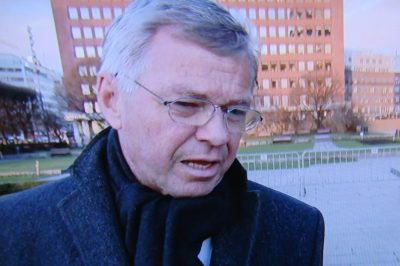International Travel to Banned Muslim Countries: US Immigration Halts Former Prime Minister of Norway at Airport

Former Prime Minister Kjell Magne Bondevik, photographed here after attending the Nobel Peace Prize ceremony in Oslo in December, was stopped by US immigration officials when he landed in the US on Wednesday. They questioned him for an hour about a stamp in his diplomatic passport showing that he’d been in Iran. PHOTO: NRK screen grab
Norway’s national commercial television channel TV2 reported Thursday night that Bondevik had traveled to the US to attend the annual prayer breakfast involving various religions that’s traditionally held after the inauguration of a new US president. Bondevik is an ordained minister and former leader of the Christian Democrats party, and has served both as Norway’s foreign minister and prime minister.
He told TV2 he was stopped at the airport’s border control and questioned for around an hour.
“They began to ask me why I had been in Iran and what I was going to do in the US,” Bondevik told TV2. “They shouldn’t have had any reason to fear a former prime minister who has been on official visits to the US several times.”
Bondevik wound up a target, however, of the new ban ordered by US President Donald Trump on entry into the US for all citizens of Iran, Iraq, Syria, Yemen, Sudan, Somalia and Libya. All refugees have also been banned from entering the US for the next four months, while Syrian citizens and refugees have been banned indefinitely.
As a former prime minister, Bondevik remains entitled to a diplomatic passport. That didn’t stop the US border agents from placing him under suspicion. Bondevik said he had also traveled to the US with the same passport containing the same stamp from Iran last year without being stopped or questioned.
“It seems as though when the name of one of the banned countries comes up, they now put up the barbed wire,” Bondevik said. “It was entirely unnecessary suspicion. I became quite provoked.”
Bondevik, who has worked for years on peace and reconciliation efforts around the world, said he can understand the fear of terror, “but you shouldn’t treat entire groups of people in this manner. I have to admit I fear the future (with Trump as president). There’s been a lot of progress in the world the last few decades, but this gives great cause for concern, along with the authoritarian leaders we see steering other large countries.”

